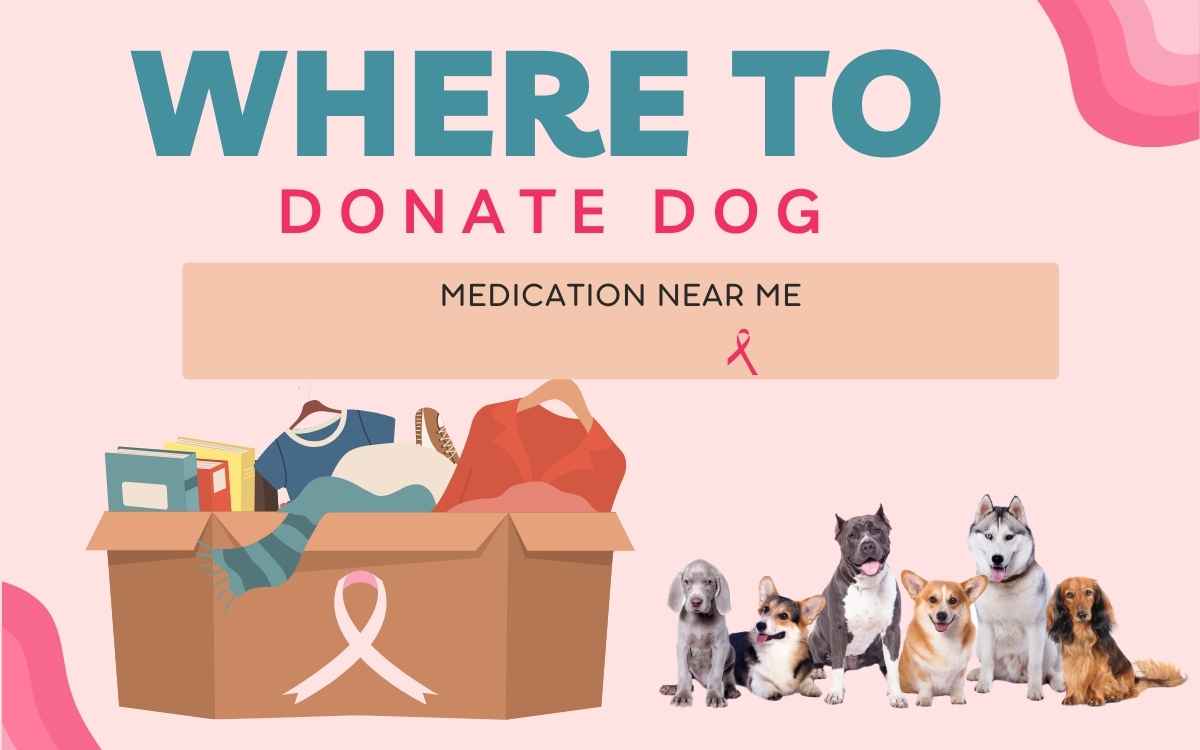In this article, we will tell you where to donate dog medication near me. Are you a pet owner with unused dog medication lying around? Don’t let it go to waste! There are thousands of dogs in need who could benefit from your generosity.
Whether you have extra heartworm preventatives, flea and tick medications, or even prescription drugs that your furry friend no longer needs, numerous organizations accept donations of dog medication near you. By donating these valuable resources, not only will you be helping out less fortunate pets, but you’ll also be making a positive impact on their health and well-being.
If you’re looking to donate dog medication near you, there are a few options you can explore. One option is to reach out to local animal shelters or rescue organizations in your area. These organizations often rely on donations to provide medical care for the animals in their care, and they may be happy to accept any unused or unexpired dog medication you have.
Another option is to contact veterinary clinics or hospitals near you. Some clinics have programs in place where they accept donated medications and use them for low-income pet owners who may not be able to afford the full cost of medication for their dogs.
Table of Contents
Research Local Organizations
Researching local organizations is a great way to find animal shelters, rescue groups, or veterinary clinics in your area that may accept medication donations.
Start by searching online or checking local directories for these organizations. Once you have a list of potential donation recipients, it’s important to reach out and inquire about their specific needs and if they accept medication donations.
Check Medication Eligibility
To check the eligibility of dog medications for donation, there are a few simple steps to follow. First, examine the medications you wish to donate and make sure they are within their expiration date. Expired medications may not be effective or safe for use, so it’s important to ensure they are still valid.
Next, verify that the medication is unopened and in its original packaging. This is crucial as opened or tampered packages may raise concerns about the integrity and safety of the medication. By donating unopened and properly sealed medications, you can help ensure that they will be used safely by those in need.
Reach Out to Selected Organizations
it is important to approach them professionally and respectfully. Start by introducing yourself and explaining the purpose of your inquiry. Ask about their current medication needs and preferences, as this will help you understand what specific items they are looking for.
In addition, it is essential to discuss the donation process with the organization. Inquire about their preferred method of receiving donations, whether it is through drop-off or pickup arrangements. This will ensure that you can make the necessary arrangements to deliver the medications to them conveniently and efficiently.
By following these steps, you can establish a clear line of communication with the organizations and ensure that your medication donations are received and utilized effectively.
Prepare Medication for Donation
Preparing medication for donation is an important process to ensure the safety and effectiveness of the donated medications. To begin, it is crucial to organize the medications neatly and securely. This involves sorting them by type or condition, such as pain relievers, antibiotics, or allergy medications. By doing so, it becomes easier for the recipient organization or individual to identify and distribute the medications accordingly.
Each medication should be labeled with its name, expiration date, and any usage instructions. This information is vital for both the recipient and potential users of the donated medications.
It is essential to store the medications in a sealed container to protect them during transport. This ensures that they remain safe from contamination or damage while being transported from one location to another. A sealed container also helps maintain the integrity of the medications until they reach their destination.
Arrange Donation
To arrange a donation, there are a few steps you can take to ensure a smooth process. First, coordinate with the organization you wish to donate to and find a suitable date, time, and location for the donation.
This will help both parties plan accordingly and avoid any conflicts. Next, make sure you have all the necessary contact information and directions for the donation drop-off. This will ensure that you know exactly where to go and who to contact if you have any questions or concerns.
Donation Process
The donation process for dog medications typically involves delivering the medications to the chosen organization as agreed upon.
it is advisable to maintain a record of the donation for your reference and potential tax deductions. This can include keeping receipts or documentation of the donated medications, as well as any correspondence or agreements with the organization.
Tax Considerations
it is always a good idea to consult a tax professional. They can provide you with guidance on whether your donation may be eligible for tax deductions or credits. This is especially important if you are making a significant donation or if you are unsure about the specific regulations in your country or state.
It is crucial to keep all receipts and documentation related to your donation for tax purposes. These documents will serve as proof of your contribution and can help support any claims you make when filing your taxes
Raise Awareness
Sharing your personal experience with donating dog medication can be a powerful way to raise awareness and inspire others to do the same. You can explain how you witnessed firsthand the positive impact that donated medications have on dogs in need.
Conclusion
The donation process for dog medication typically involves researching local animal welfare organizations that accept such donations. Once you have identified a suitable organization, you can reach out to them to inquire about their specific needs and requirements. It is important to ensure that the medication you donate is within its expiration date and has been properly stored. Some organizations may also require proof of purchase or documentation from a veterinarian.
Donating dog medication can have a significant positive impact on dogs in need. Many animal welfare organizations rely heavily on donations to provide necessary medical care for rescued dogs. By donating medication, you are helping these organizations save money on veterinary expenses, allowing them to allocate more resources towards other critical areas such as food, shelter, and rehabilitation services.
Also, read this article. How to give a dog a pill – A Complete Guide
FAQS
Can you return the medication to the vet?
Yes, in most cases you can return medication to the vet. However, it is important to note that policies may vary between veterinary clinics and there might be certain conditions that need to be met for a return. It is always best to check with your specific vet clinic about their return policy before attempting to return any medication.
Is it OK to give a dog expired medicine?
No, it is not okay to give a dog expired medicine. Just like with humans, expired medicines can lose their potency and effectiveness over time. In some cases, they may even become harmful or toxic to the dog. It’s always best to check the expiration date on any medications before giving them to your pet and consult with a veterinarian if you are unsure.
How can I get my dog medication without a vet?
It is important to note that obtaining medication for your dog without consulting a veterinarian is not recommended. Veterinarians are trained professionals who can accurately diagnose and prescribe the appropriate medication for your dog’s specific condition. Self-medicating or obtaining medications from unreliable sources can be dangerous and potentially harmful to your pet’s health.
How can I save money on my dog’s medicine?
There are a few ways you can save money on your dog’s medicine. First, consider shopping around and comparing prices at different pharmacies or online retailers. Some places may offer lower prices or discounts on certain medications. Additionally, ask your veterinarian if there are any generic alternatives to the prescribed medication that could be just as effective but at a lower cost.










